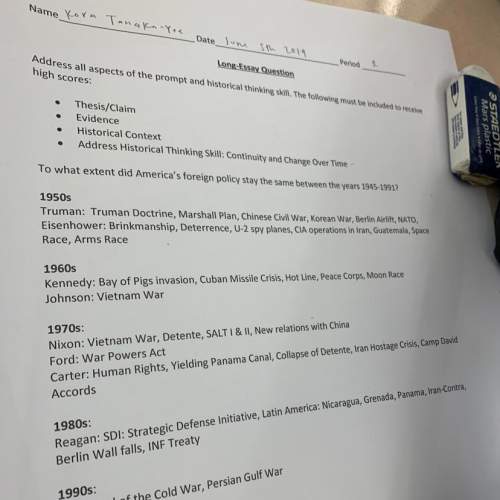
History, 18.09.2019 16:30 michealsfamily
(10 points) question 6 unsaved how was baton rouge connected to the famous bus boycott led by dr. martin luther king jr. in montgomery? question 6 options: by funding the bus boycott by sending people to lead the bus boycott by paying the parole fines when boycott members were arrested by being its model for strategy, tactics, and execution. question 7 (10 points) question 7 unsaved why was nonviolent direct action an effective strategy in combating racial segregation ? question 7 options: this form of protest was to protect the protesters , who were elderly most of the protesters were students and were not prepared to get into physical altercations it was more forceful and direct as well as peaceful and civil. no was was physically hurt question 8 (10 points) question 8 unsaved why is the phrase “with all deliberate speed” significant to the history of the civil rights movement? question 8 options: it set a time frame for desegregation those resistant to desegregation would have ample justification for interpreting the phrase to mean “as slow as desired.” it immediately ended segregation in schools it desegregated schools by race and not by gender question 9 (10 points) question 9 unsaved the civil rights act the following is an excerpt from section 201 of the civil rights act passed in 1964. read the passage and answer the questions. transcript of civil rights act (1964) title ii—injunctive relief against discrimination in places of public accommodation sec. 201. (a) all persons shall be entitled to the full and equal enjoyment of the goods, services, facilities, and privileges, advantages, and accommodations of any place of public accommodation, as defined in this section, without discrimination or segregation on the ground of race, color, religion, or national origin. (b) each of the following establishments which serves the public is a place of public accommodation within the meaning of this title if its operations affect commerce, or if discrimination or segregation by it is supported by state action: (1) any inn, hotel, motel, or other establishment which provides lodging to transient guests, other than an establishment located within a building which contains not more than five rooms for rent or hire and which is actually occupied by the proprietor of such establishment as his residence; (2) any restaurant, cafeteria, lunchroom, lunch counter, soda fountain, or other facility principally engaged in selling food for consumption on the premises, including, but not limited to, any such facility located on the premises of any retail establishment; or any gasoline station . . to whom does this law apply? question 9 options: children all persons, no matter their race, color, religion, or national origin men who served in the military women over the age of forty question 10 (10 points) question 10 unsaved the civil rights act the following is an excerpt from section 201 of the civil rights act passed in 1964. read the passage and answer the questions. transcript of civil rights act (1964) title ii—injunctive relief against discrimination in places of public accommodation sec. 201. (a) all persons shall be entitled to the full and equal enjoyment of the goods, services, facilities, and privileges, advantages, and accommodations of any place of public accommodation, as defined in this section, without discrimination or segregation on the ground of race, color, religion, or national origin. (b) each of the following establishments which serves the public is a place of public accommodation within the meaning of this title if its operations affect commerce, or if discrimination or segregation by it is supported by state action: (1) any inn, hotel, motel, or other establishment which provides lodging to transient guests, other than an establishment located within a building which contains not more than five rooms for rent or hire and which is actually occupied by the proprietor of such establishment as his residence; (2) any restaurant, cafeteria, lunchroom, lunch counter, soda fountain, or other facility principally engaged in selling food for consumption on the premises, including, but not limited to, any such facility located on the premises of any retail establishment; or any gasoline station . . all people have been promised a full and equal enjoyment of what? ? question 10 options: they were refused a college education they were refused service they were refused entry into the military they were refused the ownership of property

Answers: 1
Another question on History

History, 22.06.2019 07:30
All of the following were restrictions on free african americans, who lived primarily in the upper south except:
Answers: 3

History, 22.06.2019 08:00
Me! why was marbury v. madison such an important case? a. it confirmed that the supreme court was more powerful than congress but less powerful than the president b. it confirmed the authority of the supreme court to review a law in to determine whether or not that law is constitutional. c. it confirmed the authority of congress to increase or decrease the power of the supreme court. d. it gave the supreme court the power to confirm federal judges.
Answers: 1

History, 22.06.2019 08:40
Which type of work did slaves in the us south not engage in? gang work skilled work task work union work
Answers: 1

History, 22.06.2019 09:10
What misguided strategy caused lord william howe and the british to fail?
Answers: 2
You know the right answer?
(10 points) question 6 unsaved how was baton rouge connected to the famous bus boycott led by dr. ma...
Questions






Computers and Technology, 10.03.2020 06:41

Computers and Technology, 10.03.2020 06:42

Mathematics, 10.03.2020 06:42


Health, 10.03.2020 06:42








Mathematics, 10.03.2020 06:43





